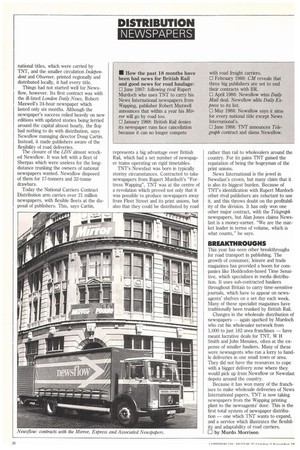DISTRIBUTION NEVVSPAPERS
Page 28

If you've noticed an error in this article please click here to report it so we can fix it.
national titles, which were carried by TNT, and the smaller circulation Independent and Observer, printed regionally and distributed locally, it had every title.
Things had not started well for Newsflow, however. Its first contract was with the ill-fated London Daily News, Robert Maxwell's 24-hour newspaper which lasted only six months. Although the newspaper's success relied heavily on new editions with updated stories being ferried around the capital almost hourly, the flop had nothing to do with distribution, says Newsflow managing director Doug Cartin. Instead, it made publishers aware of the flexibility of road deliveries.
The closure of the LDN almost wrecked Newsflow. It was left with a fleet of Sherpas which were useless for the longdistance trunking the owners of national newspapers wanted. Newsflow disposed of them for 17-tonners and 32-tonne drawbars.
Today the National Carriers Contract Distribution arm carries over 21 million newspapers, with flexible fleets at the disposal of publishers. This, says Cartin, represents a big advantage over British Rail, which had a set number of newspaper trains operating on rigid timetables.
TNT's Newsfast was born in typically stormy circumstances. Contracted to take newspapers from Rupert Murdoch's "Fortress Wapping", TNT was at the centre of a revolution which proved not only that it was possible to produce newspapers away from Fleet Street and its print unions, but also that they could be distributed by road rather than rail to wholesalers around the country. For its pains TNT gained the reputation of being the bogeyman of the print unions.
News International is the jewel in Newsfast's crown, but many claim that it is also its biggest burden. Because of TNT's identification with Rupert Murdoch other rival publishers are reluctant to use it, and this throws doubt on the profitability of the division. It has only won one other major contract, with the Telegraph newspapers, but Alan Jones claims Newsfast is a money-earner. "We are the market leader in terms of volume, which is what counts," he says.
BREAKTHROUGHS
This year has seen other breakthroughs for road transport in publishing. The growth of consumer, leisure and trade magazines has provided a boom for companies like Hoddesdon-based Time Sensitive, which specialises in media distribution. It uses sub-contracted hauliers throughout Britain to carry time-sensitive journals, which have to appear on newsagents' shelves on a set day each week. Many of these specialist magazines have traditionally been trunked by British Rail.
Changes in the wholesale distribution of newspapers — again sparked by Murdoch who cut his wholesaler network from 1,000 to just 182 area franchises — have meant lucrative deals for TNT, W H Smith and John Menzies, often at the expense of smaller hauliers. Many of these were newsagents who ran a lorry to handle deliveries in one small town or area. They did not have the resources to cope with a bigger delivery zone where they would pick up from Newsflow or Newsfast depots around the country.
Because it has won many of the franchises to make wholesale deliveries of News International papers, TNT is now taking newspapers from the Wapping printing plant to the newsagents' door. This is the first total system of newspaper distribution — one which TNT wants to expand, and a service which illustrates the flexibility and adaptability of road carriers.
by Murdo Morrison














































































